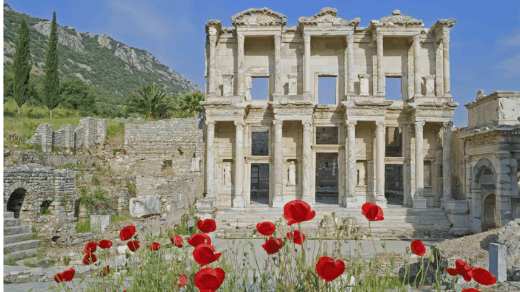
1. Ephesus
Ephesus, an ancient city of historical significance, holds a prominent place on the map, both geographically and culturally. Let’s uncover its precise location and significance.
2. Historical Importance
Ephesus boasts a rich history dating back to ancient times, making it a renowned archaeological site and a must-visit destination for history enthusiasts.
3. Geographical Context
Located in present-day Turkey, Ephesus sits on the western coast of Anatolia, near the Aegean Sea, in the region known as Ionia.
4. Proximity to Major Cities
Ephesus is situated close to several major cities, including Izmir, which is approximately 80 kilometers north of the ancient site, and Bodrum, located to the south.
5. Accessibility
Accessing Ephesus is convenient for travelers, with transportation options available from nearby cities and tourist hubs, facilitating exploration of this ancient marvel.
6. Coastal Setting
The coastal setting of Ephesus adds to its allure, offering visitors stunning views of the Aegean Sea and a pleasant climate for outdoor exploration.
7. Nearby Landmarks
Ephesus is surrounded by other notable landmarks, such as the Temple of Artemis, one of the Seven Wonders of the Ancient World, enhancing its historical significance.
8. Topographical Features
The topography of Ephesus includes hills, valleys, and plains, providing a diverse landscape for visitors to explore and appreciate.
9. Archaeological Discoveries
Excavations in Ephesus have unearthed a wealth of archaeological treasures, including well-preserved ruins of ancient structures, statues, and artifacts.
10. Cultural Heritage Site
Recognized as a UNESCO World Heritage Site, Ephesus showcases the cultural and architectural achievements of ancient civilizations, attracting visitors from around the globe.
11. Tourist Attractions
Ephesus is home to various tourist attractions, including the Library of Celsus, the Great Theater, and the Temple of Hadrian, offering insights into its storied past.
12. Religious Significance
Ephesus holds religious significance, being mentioned in the Bible’s New Testament as the site of important events in early Christianity, further enhancing its appeal to pilgrims and religious travelers.
13. Commercial Hub
In antiquity, Ephesus was a thriving commercial hub and a center of trade and commerce, connecting Asia Minor with the rest of the ancient world.
14. Cultural Exchange
Ephesus served as a melting pot of cultures, where ideas, traditions, and goods from various civilizations converged, leaving a lasting imprint on its identity.
15. Urban Development
The ancient city of Ephesus was meticulously planned, with well-designed streets, public buildings, and infrastructure, reflecting advanced urban planning principles of its time.
16. Natural Surroundings
Ephesus is surrounded by lush vegetation and scenic landscapes, offering visitors opportunities for leisurely strolls and nature walks amidst historical ruins.
17. Educational Opportunities
Ephesus provides invaluable educational opportunities for scholars, students, and enthusiasts alike, offering insights into ancient history, architecture, and urban development.
18. Conservation Efforts
Efforts to preserve and protect Ephesus are ongoing, with conservation initiatives aimed at safeguarding its archaeological heritage for future generations.
19. Cultural Festivals
Ephesus hosts cultural festivals and events throughout the year, celebrating its heritage through music, dance, and theater performances, enriching the visitor experience.
20. Sustainable Tourism
Promoting sustainable tourism practices in Ephesus is essential for preserving its natural and cultural resources while supporting local communities and economies.
21. Economic Impact
Tourism in Ephesus contributes significantly to the local economy, generating employment opportunities and income for residents in the surrounding region.
22. Spiritual Pilgrimages
Ephesus continues to attract spiritual pilgrims seeking to connect with its religious heritage and to pay homage to sacred sites associated with early Christianity.
23. Architectural Marvels
The architectural marvels of Ephesus, including its well-preserved Roman and Hellenistic structures, showcase the ingenuity and craftsmanship of ancient civilizations.
24. Cultural Exchange
Ephesus continues to serve as a symbol of cultural exchange and dialogue, fostering understanding and appreciation among visitors from diverse backgrounds.
25. A Timeless Landmark
In conclusion, Ephesus occupies a significant place on the map as a timeless landmark of historical, cultural, and architectural importance, inviting visitors to embark on a journey through the annals of ancient civilization.





